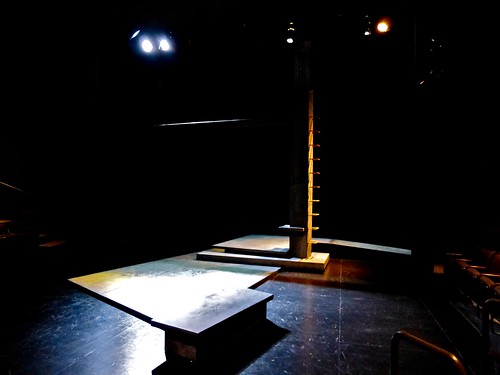Says Death in
the Ted Hughes translation of the Euripides' play "Alcestis." Death is talking to Apollo about us humans:
As far as I am concerned, their birth-cry
Is the first cry of the fatally injured.
The rest is you — and your morphine.
That is what they call you the god of healing.
Life is your hospital and you call it a funfair.
Your silly sickroom screen of giggling faces,
Your quiverful of hypodermic syringes
That you call arrows of inspiration.
We went out to
see that play yesterday in Spring Green, which looked like this:

The light through the reddish grass was lovely, but this wasn't one of the outdoor plays. We were indoors for this play...

... which is about a queen, Alcestis, who gives her life so that the king, Admetus, can live, in some deal that makes sense to the gods. Alcestis is the least interesting character in the play that gets her name, since it's established at the get-go that she's going to die, and she does exactly that early on. She's mostly talked
about.
In fact, in the end, when —
spoiler alert — Heracles brings her back from the dead, she's incapable of speaking for the first 3 days of resurrected life, and the play ends before that happens, so we never hear from her again. My favorite character was the king's father, who, we learn at the outset, refused to give his own life for his son's. The son is outraged that this old corpse of a man — as he sees it — clings to the meaningless shred of life he's got left. When the old man finally speaks for himself, he says just that: It's
all he's got left.
Driving back home, (ad)Meade(us) and I talked about the play, and the phrase "death panels" came up. The son thought it was selfish and disgusting that his elderly father and mother wouldn't die. Quite apart from his need to have someone die for him, he had contempt for their attachment to worthless life. Of course, Death, quoted at the top of this post, thought all of life was agonizing drama, and the newborn baby's cry was crying at the fatal injury that is birth. All of life is a hospital,
and you call it a funfair.





